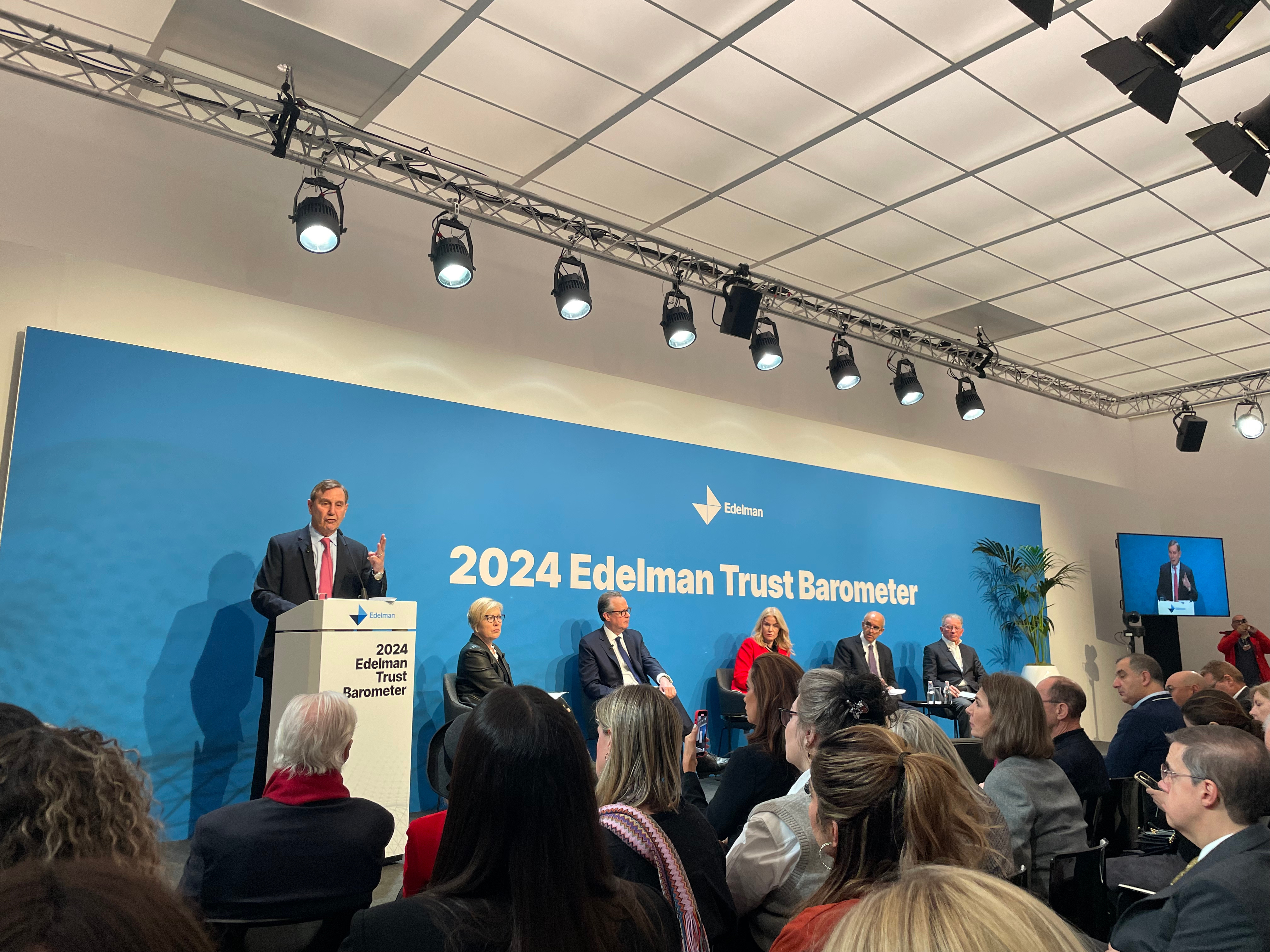Arun Sudhaman 16 Jan 2024 // 11:12AM GMT

DAVOS — In the wake of Edelman Trust Barometer findings that reveal how innovation is fuelling distrust, businesses need to slow down and make a far more compelling case for the benefits of new technologies — according to a panel at the World Economic Forum in Davos today.
"Innovation is being poorly managed, and business isn't paying attention to this," said Richard Edelman, presenting the research findings. "If we do this badly, business will repeat the problems of 2008, where business lost trust because of the collapse of financial markets."
The annual survey of more than 32,000 participants in 28 countries found respondents by a two-to-one margin believe innovation is being poorly managed. That was true for respondents across developed and developing nations and demographics.
Innovation has also become politicized, especially in Western democracies where right leaning individuals are far more likely than those on the left to resist it, the study found. The biggest gaps are in the US (41 points), Australia (23 points), Germany (20 points), and Canada (18 points).
China, a global powerhouse in innovation, is also grappling with trust issues. A resounding 67% of Trust Barometer respondents in China believe that "science is too politicized," while 75% feel that "government has too much influence on the outcome of innovation."
"The Chinese have spoken," said Edelman. "They are not happy in this relationship between innovation and their government."
The global Trust Barometer further revealed that two-thirds of respondents believe that the innovation system is skewed in favor of the wealthy, causing widespread job insecurity — amid an IMF report that predicts AI will hit 40% of jobs and worsen inequality.
"Two-thirds told us the system is biased to the wealthy," said Edelman. "It should all be a big warning sign — you're going too fast, I don't feel heard. We're charging ahead as if it's all assumed to be good, and it's not by a lot of people. They are scared for their jobs."
Edelman also stressed the pivotal role of trust in government. "The low trust in government is absolutely fundamental to the low trust in innovation. Business should not want government out of the way. In the West, they think science is too politicized. Two-thirds tell us government regulators lack the ability to manage innovation. It's important we help regulators understand what you're doing."
Acceptance of innovation is hanging in the balance, with groundbreaking technologies like AI and mRNA facing resistance in various quarters. "Acceptance of innovation is right now at stake," continued Edelman. "The right has adopted this innovation boom as something that's bad for the people."
Ultimately, said Edelman, business must accept that "implementation and acceptance are as important as invention."
"Science speaks to the elites, it has to speak to the average Joe," he said. "It must be seen as listening, not preaching. We can't assume that innovation is necessarily a positive for all."
Renowned tech figure and C3.ai CEO Thomas Siebel drew attention to the dual nature of innovation: "This generative AI business is unstoppable. The benefits that will accrue are really remarkable. The dark side is almost unthinkable. Social media might be the most destructive invention in the history of mankind."
In particular, Siebel expressed concerns about the use of technology to control populations: "We know that social media is driving divisions between us. This idea that we are going to have large bureaucracies that are going to inspect algorithms, to ensure they don't have deleterious consequences, get over that. We don't know how these algorithms work. We need to talk about it because it makes Orwellian Europe look like the Garden of Eden."
Former Denmark Prime Minister Helle Thorning Schmidt urged business leaders to take responsibility: "The business community is the most trusted in the world. Even though they don't like to be mixed up in politics, they still have to engage in politics. I truly believe business can be a bridge builder, particularly in American society."
Schmidt emphasized the need for social media and tech companies to combat false content: "The social media and tech companies need to take much more responsibility than they have so far. All these issues demand transparency."
Doug Peterson, CEO of S&P Global, highlighted the importance of public-private partnerships in winning back trust: "It's absolutely necessary to work together, not just to fight each other. We have to shape the rules together. Trust is now going to be inherent in everything we're doing, especially when we're looking at generative AI."
Meanwhile, Harvard Business school dean Srikant Datar stressed the challenges posed by the speed of innovation: "How do we think about innovation in business models and in terms of acceptance? You've got to be very innovative in implementing innovation. As the pace of innovation increases, we need to pay much more attention to the acceptance of innovation."
That also requires involving younger generations in decision-making: "If business is going to take all this responsibility, we need boards to support that," said Thorning-Schmidt. "We are going to transfer more resources to the younger generations than ever before. My advice would be to engage those generations on the boards."
Gillian Tett, editor-at-large of the Financial Times, acknowledged the magnitude of the challenges ahead: "It's a challenging set of messages. We have our work cut out for us."



































.jpg)

















